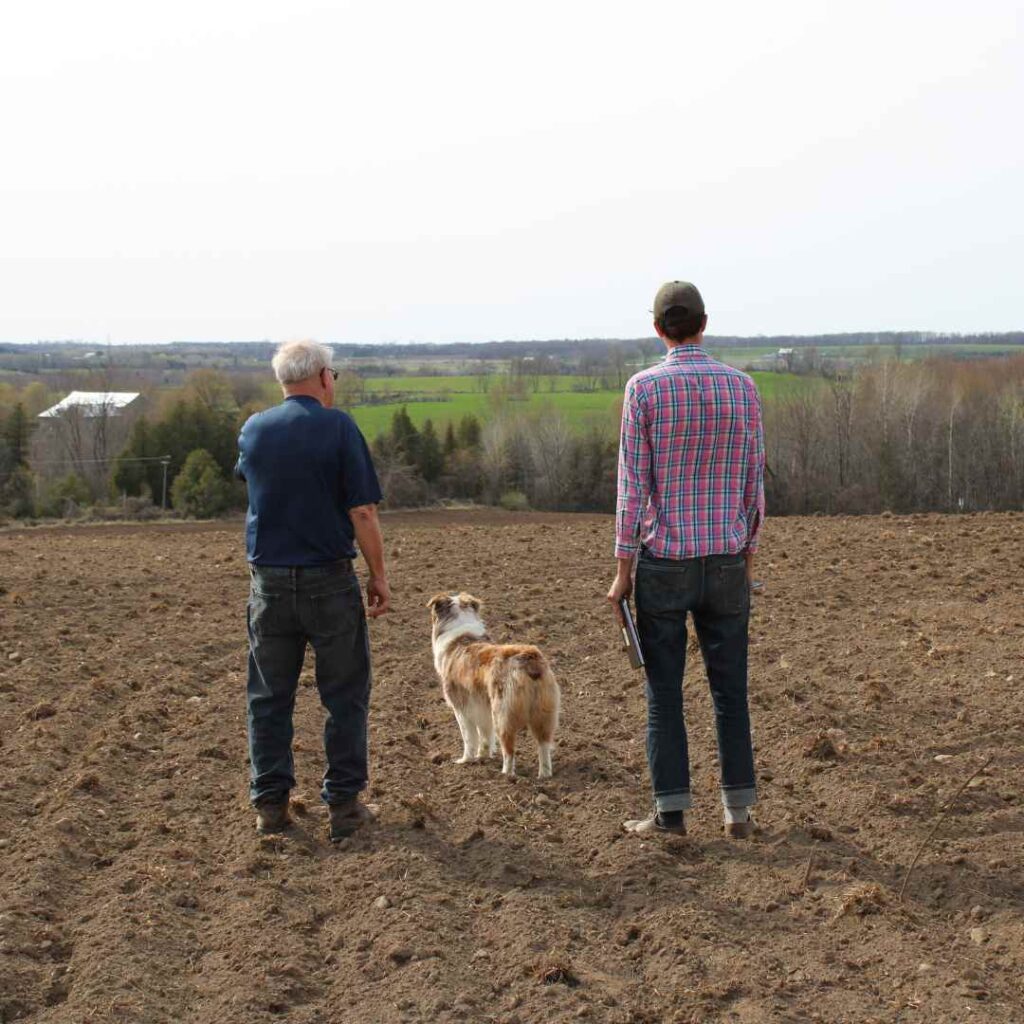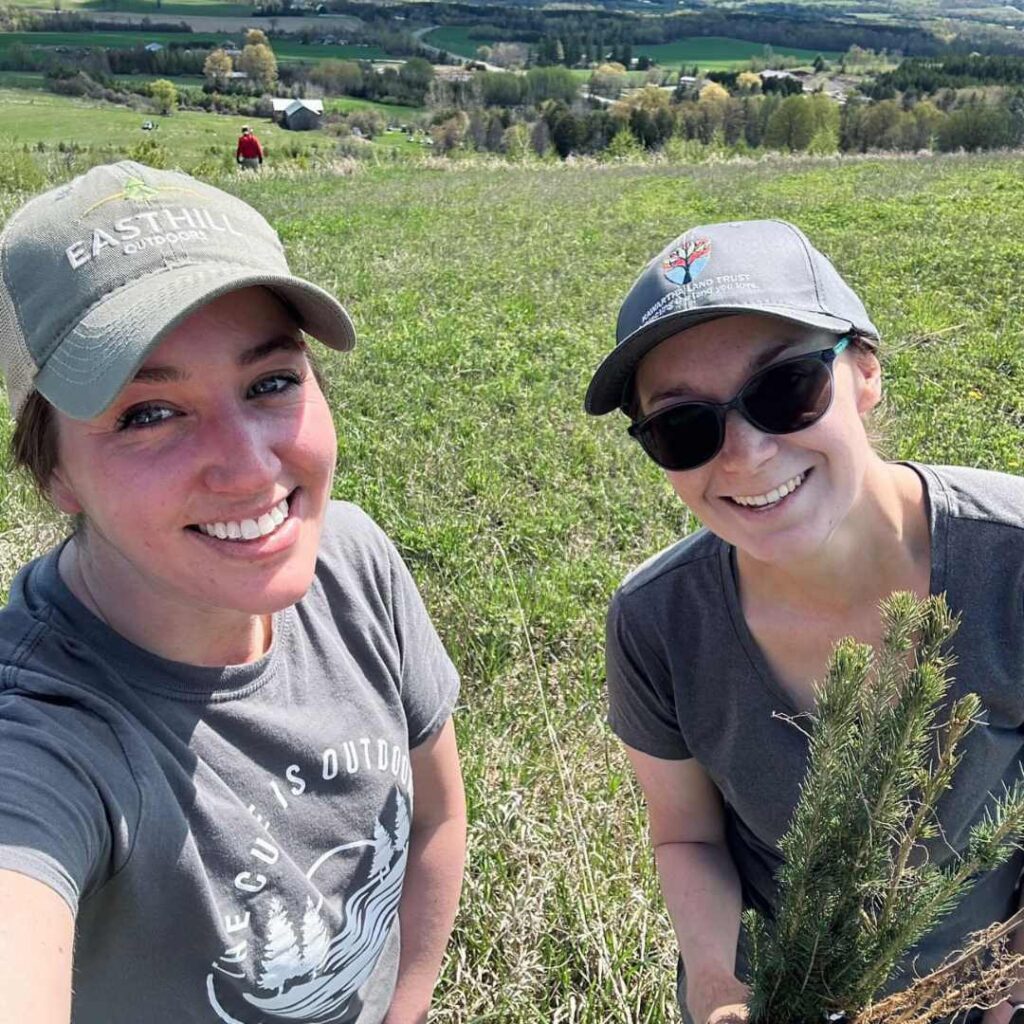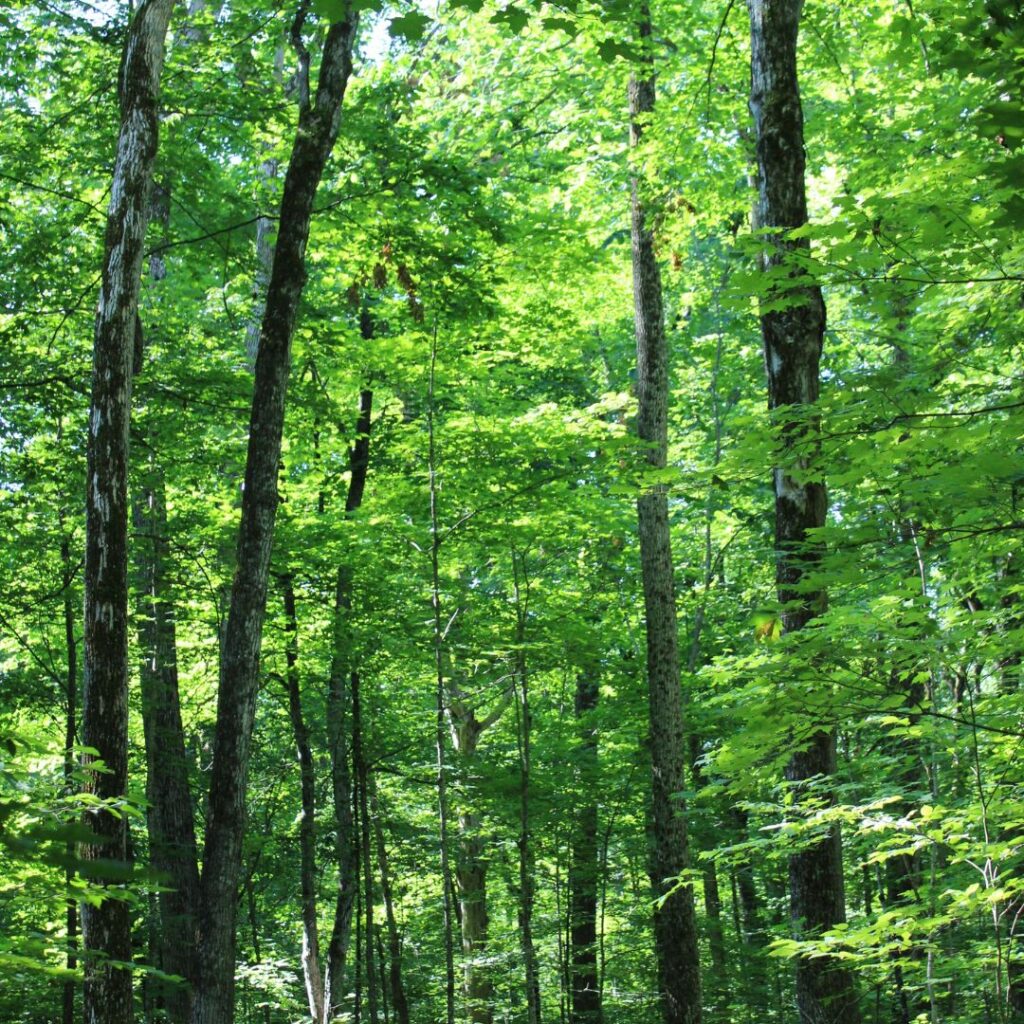The incredible landscape of the Kawarthas is recognizable and celebrated for both its natural and working lands.
You can’t go far in any direction without driving past verdant farmland, pastures dotted with cattle or sheep, and hedgerows alive with birdsong.
In the north of our region, vast forests have allowed nature and communities to thrive together — in some locations in better balance than others.
Farmer Bruce Kidd (L) and KLT’s Thom Unrau at the Kidd Farm CEA in Duoro in Spring 2022. (KLT)

Working lands matter deeply to our sense of place, our local identities, our families’ legacies, and our economic futures. When we work together, net gains for nature and climate change can be achieved on working lands.
Despite the importance of farms, statistics from the 2021 Census of Agriculture show that Ontario is losing approximately 319 acres of farmland daily.
Additionally, there are no tree-cutting bylaws for private land in the Kawarthas. High-grade logging and land clearing continue to impact our forests. In contrast, sustainably managed forests provide green building materials and long-term economic benefits, while wildlife habitat and our waters thrive.
The lands that Kawartha Land Trust owns will remain nature reserves. However, to have a full landscape impact in the Kawarthas, KLT collaborates with private landowners to protect and support sustainable working lands. We all have a role in creating a more sustainable future.

You have options.
Farmers and forest managers know that long-term thinking is essential. Treating the land right will ensure it supports the environment and your business.
Long-term, permanent protection of your farm or woodlot can be achieved with KLT.
Protecting your farm or forest forever protects ensure the future of local food, materials, and agriculture. Farms and forests support the long-term needs of people and nature in the Kawarthas.
We’re also bringing innovative solutions to the sustainable use of working private lands in the Kawarthas through our Partners in Conservation program.
Have questions about KLT’s work with farms and woodlots? Review the land protection options below or reach out to us at [email protected] or call 705-743-5599.
Option 1:

Farmer Bruce Kidd and KLT’s Thom Unrau, Director of Community Conservation, at the Kidd Farm CEA. Kidd and his family wanted to ensure their farmland would be in production for years to come.
A Conservation Easement Agreement (CEA) is a permanent, legally binding agreement with Kawartha Land Trust (KLT) to protect farmland and productive forests on your property forever.
CEAs take great consideration to develop. The goal is to allow the flexibility that farming and sustainable forestry requires, while protecting the land from development that would result in the potential loss of our important working lands.
In some cases, a CEA may require a financial commitment from the landowner. As a voluntary donation of a right in your land, CEAs are considered a charitable gift. KLT issues an income tax receipt for their registration, following Canadian Revenue Agency (CRA) guidelines.
Have questions about CEAs?
Reach out to us at
or call 705-743-5599. We look forward to speaking with you!
Option 2:

(L-R) KLT volunteer and KLT’s Partners in Conservation Coordinator, Rachel Barrington, at a recent fieldwork day to plant trees on a Partners in Conservation property.
What if a nature conservation organization listened to and helped farmers and foresters?
Our productive landscape is in the hands of thousands of dedicated landowners. Their practices have a positive effect on the future of our region’s food, economies, wildlife, and water quality.
The goal of Kawartha Land Trust’s (KLT) Partners in Conservation program is to harness the power of voluntary action taken by landowners interested in supporting a sustainable working landscape in the future.
We believe that KLT can build a network of thousands of landowners. Together, this collective can create a future landscape where farms address the climate crisis, provide new opportunities for young farmers, and increase biodiversity. Where private working forests are managed for long-term benefit of all.
Participation as a member requires no permanent commitment and no change to title on your land.
Through working with farmers and foresters through KLT’s Partners in Conservation program, our goal is to create a sustainable landscape where land provides the food and materials we need, in balance with the needs of people and nature.
Have questions about the program?
Reach out to us at [email protected]
or call 705-743-5599. We look forward to speaking with you!
Option 3:

Pipers’ Woods, a mature woodlot, was donated to KLT in 2022 by two anonymous donors who wanted to protect the interior forest habitat. The donors retained life access rights for recreation and the sustainable harvest of firewood.
You know that farming and sustainable forestry is not easy. Kawartha Land Trust (KLT) staff are not farmers or foresters. As such, we generally do not seek donations of working lands with an expectation that KLT would continue operations. Donated properties under our ownership are generally nature reserves.
Owning land, is, however, a key ability of KLT that many organizations are not set up for. We have partnerships with organizations in the farming (Ontario Farmland Trust) and forestry sectors (Ontario Woodlot Association) that might benefit from a property.
If you have no successor for your farm or woodlot, and are considering land donation to keep it operating with a vision that it support the future of sustainable farming or forestry in the Kawarthas, we are open to collaborating on creative solutions with you and partner organizations.
Questions about land donation?
Have questions about land donation? Reach out to us at [email protected] or call 705-743-5599. We look forward to speaking with you!
Do you wonder about the important natural, agriculture and water features in your neighbourhood?
Do you own over 30 acres?
Submit your information to receive a custom map of your property made by our knowledgeable team.